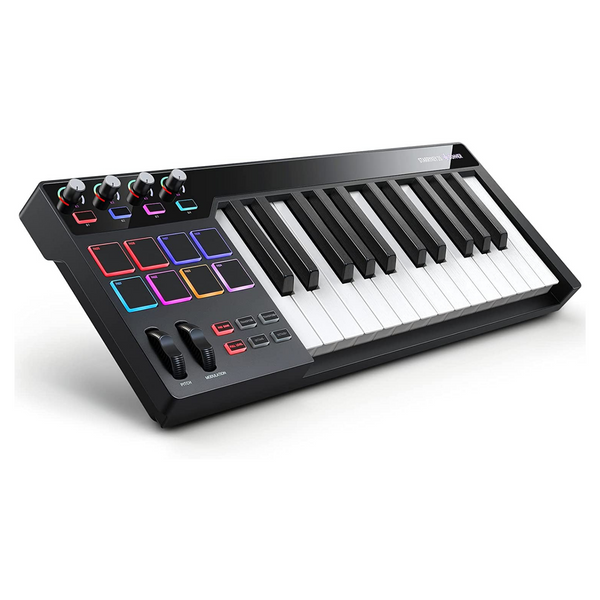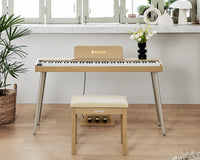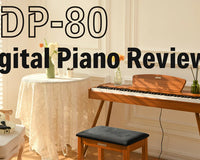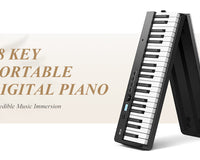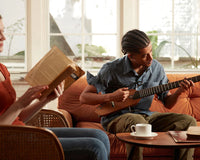Learning the piano is never easy. Buying a piano, like anything you're unfamiliar with, can be just as complicated. With Donner Music, find the best solution to learn and buy the ideal piano for you.
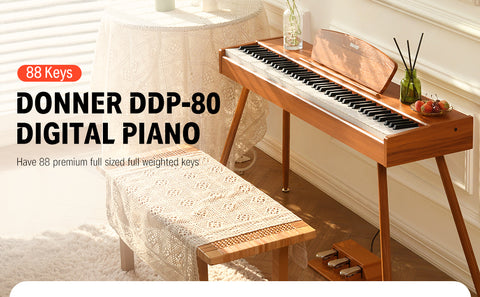
What are the Best Pianos for Beginners?
You don't learn until you have your hands on a piano. However, there are a few essentials to know beforehand. The first being: the difference between acoustic and digital piano.
Acoustic pianos are the ones we see the most in theaters and concerts. They work with a mechanism with hammers which transform the pressure emitted by the keys into sound. Acoustic pianos are therefore usually larger than their digital counterparts. In addition, their tuning and maintenance require the intervention of professionals.
Conversely, digital pianos generate sound via electronic signals. Without this mechanism of hammers, the digital piano is therefore more compact. Some variants, such as electronic keyboards, are even portable. And their tuning can be done with simple digital adjustments.
That's why we recommend that beginners start learning on the digital piano. We have prepared this article for you to be sure that the digital piano is the best for you.
How to Choose a Digital Piano for Beginners
Once the decision is made between digital or acoustic piano, it is necessary to know which type of digital piano will suit you best. Here are 5 things you should know before buying your first digital piano.
First, here are the different types of digital piano: there are upright digital pianos and portable digital pianos. This last category includes keyboards.
Upright pianos benefit from a beautiful piece of furniture similar to that of acoustic pianos. Compared to keyboards, they are more misunderstood with acoustic pianos and also benefit from all this class. They are therefore very popular in the decor of a living room. The most popular upright digital pianos are the DDP-100 and the DEP-10.
Donner DEP-10S 88 Key Semi-Weighted Digital Piano Keyboard
The DEP-10 has 128 polyphonic notes and 8 high-quality sound libraries. Boasting semi-weighted keys, it will pick up even the smallest subtleties of your playing and provide excellent key response.
Once you know the difference between an upright and a portable digital piano, all that remains is to choose the right piano for you. In the article “How to Choose a Digital Piano for Beginners”, our experts offer you a more detailed guide on how to choose a digital piano with criteria such as: your budget, the space available and your objectives.
Key Features of Digital Pianos to Consider
Sound Quality
The sound quality of digital pianos depends mainly on their electronic components. Always look at digital pianos that have the best sound outputs.
Or more simply, digital pianos with large sound libraries will benefit from better, more precise and realistic sound. This is why you should look for pianos that have the most storage and memory.
Key Sensitivity and Response
In any keyboard purchase, weight, feel, and key response are extremely important factors. Through hammer action, the keys of an acoustic piano produce a certain response. To reproduce this effect and thus not be confused when going from digital to acoustic, digital keyboards simulate this effect with weighted keys. There are three types of heavy touch effects: unweighted, semi-weighted, and weighted keys.
Weighted keys, or heavy touch, are the closest effect to that produced by hammer action. Most heavy touch keyboards benefit from increasing weighting. That is to say that the highest notes are less weighted than the lowest keys, to reproduce exactly the feeling of playing a hammer mechanism.
Key sensitivity is also an important factor. Velocity sensors detect the speed and force with which a key is pressed. By calculating its data, the keyboard will know which is the most appropriate sound to play corresponding to the situation. High-quality digital pianos capture even the smallest subtleties of the pianist's playing, and are thus able to determine their timbre and volume.
Number of Tones
It's fun and entertaining to be able to play different instruments with one and the same keyboard: acoustic piano, percussion, drums, string instruments etc.
In any case, we must not fall into the trap of quantity at the expense of quality. It can be fun at first, but keep in mind that it is important to choose a piano that has good quality piano sound, all the more basic and essential.
Polyphony
Polyphony is the number of notes a piano can play at once. Standard models generally have a polyphony of 32 to 64 notes. You can start with a piano with 32 polyphonic notes. The greater the polyphony, the better. For more advanced playing, you can opt for polyphonies of up to 128 notes and even more.
Amplification et Expansion
If you play the piano most often at home, the piano's built-in speakers will do the trick, and a small amplifier is never too much. But if you play in concert, or for shows, make sure that your piano has the right outputs to be able to be connected to a sound system.
Backing Tracks and Tools
Manufacturers often incorporate features that can help beginners in their learning, such as: ready-made rhythms to follow, different metronome speeds, backing tracks, etc.
These tools, and particularly the metronome, are recommended to develop a sense of rhythm in a beginner.
What are the Other Types of Digital Pianos?
If upright digital pianos and keyboards hold no secrets for you, you can try new types of digital keyboards, such as: MIDI keyboards, small, playful, with many features, and produces unique sounds and effects. Perfect for composing and mixing.
You can also turn to synthesizers, or more commonly: a synth. They are generally used by composers but are also very popular with amateurs who want to learn the basics of music production. Here's a professional musician's review of Donner's most popular B1 analog bass synthesizer, by David Hilowitz.
In addition to its classic design, the B1 is top notch input and output options. Check out the article to find out why David raves so much about the B1's design and value for money.
Things to Know Before Learning to Play the Digital Piano
If you've decided to get started with a digital piano, and especially an electronic keyboard, here is an article on how to start learning to play on a digital piano. It lists the most important things to know and prepare, such as: the fundamental setup, the perfect position to play, and where to find good free tutorials.




















